#Roark Capital
Explore tagged Tumblr posts
Text
Union pensions are funding private equity attacks on workers

On October 7–8, I'm in Milan to keynote Wired Nextfest.

If end-stage capitalism has a motto, it's this: "Stop hitting yourself." The great failure of "voting with your wallet" is that you're casting ballots in a one party system (The Capitalism Party), and the people with the thickest wallets get the most votes.
During the Cultural Revolution, the Chinese state would bill the families of executed dissidents for the ammunition used to execute their loved ones:
https://www.quora.com/Is-it-true-the-Chinese-government-makes-the-families-of-executed-people-pay-for-the-cost-of-bullets
In end-stage capitalism, the dollars we spend to feed ourselves are used to capture the food supply and corrupt our political process:
https://pluralistic.net/2023/10/04/dont-let-your-meat-loaf/#meaty-beaty-big-and-bouncy
And the dollars we save for retirement are flushed into the stock market casino, a game that is rigged against us, where we are always the suckers at the table:
https://pluralistic.net/2020/07/25/derechos-humanos/#are-there-no-poorhouses
Everywhere and always, we are financing our own destruction. It's quite a Mr Gotcha moment:
https://thenib.com/mister-gotcha/
Now, anything that can't go on forever will eventually stop. We are living through a broad, multi-front counter-revolution to Reaganomics and neoliberal Democratic Party sellouts. The FTC and DOJ Antitrust Division are dragging Big Tech and Big Meat and Big Publishing into court. We're seeing bans on noncompete clauses, and high-profile government enforcers are publicly pledging never to work for corporate law-firms when they quit public service:
https://pluralistic.net/2023/09/09/nein-nein/#everything-is-miscellaneous
And of course, there's the reinvigoration of the labor movement! Hot Labor Summer is now Perpetual Labor September, with 75,000 Kaiser workers walking out alongside the UAW, SAG-AFTRA and 2,350 other groups of workers picketing, striking or protesting:
https://striketracker.ilr.cornell.edu/
But capitalism still gets a lick in. Union pension plans are some of the most important investors in private equity funds. Your union pension dollars are probably funding the union-busting, child-labor-employing, civilization-destroying Gordon Gecko LARPers who are also evicting you from the rental they bought and turned into a slum, and will then murder you in a hospice that they bought and turned into a slaughterhouse:
https://pluralistic.net/2023/04/26/death-panels/#what-the-heck-is-going-on-with-CMS
Writing for The American Prospect, Rachel Phua rounds up the past, present and future of union pension funds backing private equity monsters:
https://prospect.org/labor/2023-10-04-workers-funding-misery-private-equity-pension-funds/
Private equity and hedge funds have destroyed 1.3 million US jobs:
https://united4respect.org/press-release/people-who-work-at-walmart-sears-amazon-formerly-toys-r-us-more-join-forces-together-as-united-for-respect-2-2-2-2-5-3/
They buy companies and then illegally staff them with children:
https://www.dol.gov/newsroom/releases/whd/whd20230217-1
They lobby against the minimum wage:
https://pestakeholder.org/wp-content/uploads/2021/04/Insire-Brands-memo-on-15-wage.pdf
They illegally retaliate against workers seeking to unionize their jobsite:
https://www.hoteldive.com/news/dc-hotel-workers-enlist-us-representatives-to-fight-sofitel-union-busting/650396/
And they couldn't do it without union pension funds. Public service union pensions have invested $650 million with PE funds. In 2001, the share of public union pensions invested in PE was 3.5%; today, it's 13%:
https://docs.google.com/spreadsheets/d/1B0vv26VEFmwtfw5ur6dSDMY8NftvZKij/
Giant public union funds like CalPERS are planning massive increases in their contributions to PE:
https://www.calpers.ca.gov/page/newsroom/calpers-news/2023/calpers-preliminary-investment-return-fiscal-year-2022-23
This results in some ghastly and ironic situations. Aramark used funds from a custodian's union to bid against that union's members for contracts, in an attempt to break the union and force the workers to take a paycut to $11/hour:
https://www.bloomberg.com/news/articles/2012-11-20/pension-fund-gains-mean-worker-pain-as-aramark-cuts-pay
Blackstone's investors include the California State Teachers Retirement System (CalSTRS). The PE ghouls who sucked Toys R Us dry were funded by Texas teachers.
Then there's KKR, one of the most rapacious predators of the PE world. Half of the investors in KKR's Global Infrastructure Investors IV fund are public sector pension funds. Those workers' money were spent to buy up Refresco (Arizona Iced Tea, Tropicana juices, etc), a transaction that immediately precipitated a huge spike in on-the-job accidents as KKR cut safety and increased tempo:
https://www.osha.gov/ords/imis/establishment.inspection_detail?id=1675674.015
Petsmart is the poster-child for PE predation. The company uses TRAPs ("TrainingRepaymentAgreementProvision") clauses to recreate indentured servitude, forcing workers to pay thousands of dollars to quit their jobs:
https://pluralistic.net/2022/08/04/its-a-trap/#a-little-on-the-nose
Why would a Petsmart employee want to quit? Petsmart's PE owner is BC Partners, and under BC's management, workers have been forced to work impossible hours while overseeing cruel animal abuse, including starving sick animals to death rather than euthanizing them, and then being made to sneak them into dumpsters on the way home from work so Petsmart doesn't have to pay for cremation. 24 of BC Partners' backers are public pension funds, including CalSTRS and the NYC Employees' Retirement System:
https://prospect.org/culture/books/2023-06-02-days-of-plunder-morgenson-rosner-ballou-review/
PE buyouts are immediately followed by layoffs. One in five PE acquisitions goes bankrupt. Unions should not be investing in PE. But the managers of these funds defend the practice, saying they "facilitate dialog" with the PE bosses on workers' behalf.
This isn't total nonsense. Once upon a time, public pension fund managers put pressure on investees to force them to divest from Apartheid South Africa and tobacco companies. Even today, public pensions have successfully applied leverage to get fund managers to drop Russian investments after the invasion of Ukraine. And public pensions pulled out of the private prison sector, tanking the valuation of some of the largest players.
But there's no evidence that this leverage is being applied to pensions' PE billions. It's not like PE is a great deal for these pensions. PE funds don't reliably outperform the market, especially after PE bosses' sky-high fees are clawed back:
https://papers.ssrn.com/sol3/papers.cfm?abstract_id=3623820
Pension funds could match or beat their PE returns by sticking the money in a low-load Vanguard index tracker. What's more, PE is getting worse, pioneering new scams like inflating the value of companies after they buy and strip-mine them, even though there's no reason to think anyone would buy these hollow companies at the price that the PE companies assign to them for bookkeeping purposes:
https://www.institutionalinvestor.com/article/2bstqfcskz9o72ospzlds/opinion/why-does-private-equity-get-to-play-make-believe-with-prices
To inject a little verisimilitude into this obvious fantasy, PE companies sell their portfolio companies to themselves at inflated prices, in a patently fraudulent shell-game:
https://www.ft.com/content/646d00f4-af5d-4267-a436-54fb3bc1697b
What's more, PE funds aren't just bad bosses, they're also bad landlords. PE-backed funds have scooped up an appreciable fraction of America's housing stock, transforming good rentals into slums:
https://pluralistic.net/2022/01/27/extraordinary-popular-delusions/#wall-street-slumlords
PE is really pioneering a literal cradle-to-grave immiseration strategy. First, they gouge you on your kids' birth:
https://pluralistic.net/2021/10/27/crossing-a-line/#zero-fucks-given
Then, they slash your wages and steal from your paycheck:
https://papers.ssrn.com/sol3/papers.cfm?abstract_id=3465723
Then, they evict you from your home:
https://pluralistic.net/2023/06/05/vulture-capitalism/#distressed-assets
And then they murder you as part of a scam they're running on Medicare:
https://pluralistic.net/2023/08/05/any-metric-becomes-a-target/#hca
As the labor movement flexes its muscle, it needs to break this connection. Workers should not be paying for the bullet that their bosses put through their skulls.

If you'd like an essay-formatted version of this post to read or share, here's a link to it on pluralistic.net, my surveillance-free, ad-free, tracker-free blog:
https://pluralistic.net/2023/10/05/mr-gotcha/#no-ethical-consumption-under-capitalism

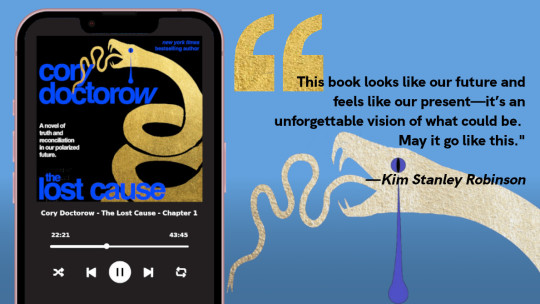
My next novel is The Lost Cause, a hopeful novel of the climate emergency. Amazon won't sell the audiobook, so I made my own and I'm pre-selling it on Kickstarter!
#pluralistic#labor#pensions#finance#private equity#toys r us#Rachel Phua#kkr#bain capital#calpers#aramark#Private Equity Stakeholder Project#RefrescoArizona Iced Tea#CalSTRS#Roark Capital#child labor#blackstone#PSSI
174 notes
·
View notes
Text
0 notes
Text
Subway Getting New Owners
Subway, the sandwich chain, is being sold to equity firm Roark Capital in a $9.6 billion deal expected to expand the chain. Subway made the announcement on Thursday, a bare-bones announcement that doesn’t reveal any details of the pending deal. Roark specializes in franchised restaurants, and already has their fingers in two holding companies which between them own Arby’s, Dunkin’ Donuts, Jimmy…

View On WordPress
0 notes
Text
Make Me A Sammich
Sometimes too much of a good thing can be a bad thing. You can reach saturation as well as satiation. You can only consume so much of anything, no matter how good it is.
Just ask the folks at Subway, the sandwich shop chain that recently sold to Roark Capital. The seemingly ubiquitous chain once had more than 27,000 shops in the US alone. In recent years it has trimmed some fat, and was down to 20,576 at the end of 2022. In many regards, this fast-food outlet is the Dollar General of dining. By comparison, Dollar General has more than 19,000 stores across the US.
To put things in better perspective, Subway dwarfs industry giant McDonald’s, which has 13,514 units across the nation. It’s just that Subway shops have always been smaller, and could easily fit into strip centers, seldom appearing in freestanding structures.
The family-owned chain had been trying to sell itself since last winter, and Roark, a private equity firm, reached an agreement to scoop them up for north of $9 billion. And always mentioned in the same breath is that Roark also owns Dunkin.

What they don’t tell us, though, is that Roark is a growing giant in fast food. It owns Inspire Brands, which owns—drumroll, please—not just Dunkin, but also Arby’s, Baskin-Robbins, Sonic, Jimmy Johns, and Buffalo Wild Wings. If this is beginning to sound like an empire, you would be right in your assessment. About the only thing missing from their portfolio is pizza.Give them a little time, and I bet they will fix that.
I do find it odd that they bought a sandwich chain when they already own Jimmy Johns. How they handle having two in the same domain is yet to be determined. But, it is possible through product and market differentiation that they can make both viable.
As for Subway, they had grown as stale as week-old bread. Their menu seldom changed, quality lagged, and the old $5 foot-long made it tough for franchisees to actually make money. As much as their audience-of-one model was great, and their “sandwich artist” motif appealing, it just became a tired concept. Competitors like Jersey Mike’s, Firehouse, and Quiznos were eating their lunch, offering far tastier and innovative menu items. Oh, and never mind the PR black eye when spokesperson Jared Fogle was convicted. It didn’t help.
I suspect that Roark will continue right-sizing the chain as it seeks to reinvent the brand. How it shakes out those franchisees is anyone’s guess, but it needs to be done. There was a time when Subway had such low costs of entry that practically anyone could afford it, and Subway would happily sell you a franchise, even if you were right across the street from your grandmother’s Subway shop. Their more-is-better strategy worked for a while, even if it did nothing to ensure a degree of local exclusivity.
And the comparison to Dollar General is fair. While DG is corporately-opened, the company typically opens stores where others will not or cannot, including rural areas and impoverished inner-city neighborhoods. Subway also opens shops where it might be the only franchised chain for miles, if only because the costs of entry are low.
But as I said earlier, too much of a good thing can turn sour. How many more Dollar General stores can we possibly support? And how many more sub sandwiches can we eat?
Good for Roark on its latest acquisitions. PE firms typically buy distressed companies, turn them around, and then sell them. Thus far, Roark appears to be intent on adding to its portfolio. There may be too much money to be made by just keeping them all. In fact, its ghost kitchen in Atlanta demonstrates both sheer genius as well as huge profit potential by combining all of its brands under one roof. And the food made under that roof is available only by delivery.
I see good things ahead for Subway. Roark is no Johnny-come-lately, and has the chops to prove it. Make me a tasty veggie sandwich on Italian, and I’ll call it good. Foot-long, of course.
Dr “And That’s A Good Thing, Not A Bad Thing” Gerlich
Audio Blog
1 note
·
View note
Text

did not know the situation was so dire
0 notes
Text
Ayn Rand dorks now own Subway, Arby's and Jimmy Johns
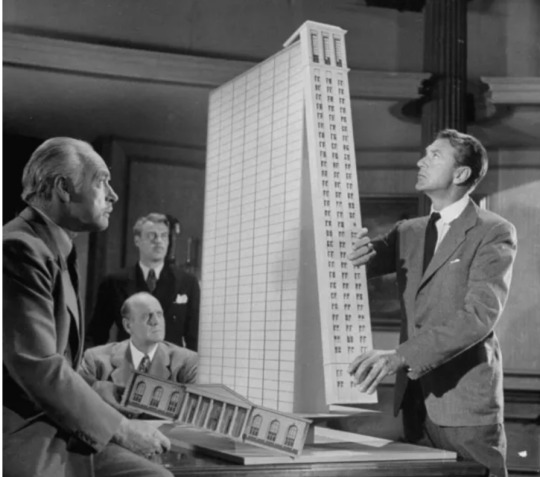
(if I didn't have to get to work, I'd put a long sandwich here) Subway officially closed the deal today to be bought by the same company that owns Cinnabon and the Cheesecake Factory as well as all those sandwich chains. What's the name of the company? Roark Capital. According to their website, they're named for Howard Roark, the hero of Ayn Rand's The Fountainhead:
"Our name signifies our admiration for the qualities embodied by Howard Roark but, as a firm of diverse viewpoints, it does not signify adherence to any particular political philosophy.
"Howard Roark's unwavering commitment to his individualistic architectural style put him at odds with the then entrenched powers and prevailing popular whims. While many of his peers surrendered to those powers and whims to attain fortune and fame, he refused to succumb and stayed true to himself and his work, at great personal cost. Eventually, the prevailing architectural elites were exposed as frauds, and Howard Roark was vindicated and celebrated as visionary."
These weird nerds now own a depressingly large number of restaurants that were in competition with each other for a long time.
#ayn rand#the fountainhead#objectivism#lol#lmao#venture capital#subway#sandwich#five dollar footlong#howard roark#capitalist hell#late stage capitalism#news
0 notes
Text

@artofmisi's Roark and Itziar, a tragic love story I know exists even if I only saw just a few puzzle pieces of it.
If you recognise the reference, do NOT come for me I do not take constructive criticism on my choices or taste in movies.
Happy Capitalism-Dressed-as-Love Day, everyone! Day 5 of OCKiss is here! and so is more render-y style.
18 notes
·
View notes
Text
companies that consistently donated to trump in 2016, 2020, & 2024
vetted by Snopes
American Securities (Conair and Cuisinart)
Arizona Diamondbacks baseball team (owned by Ken Kendrick, who did donate)
Ashley Furniture
Auto Zone
Cincinnati Financial Insurance
Dean Foods (before it went bankrupt)
Discount Tire
ExxonMobil
Flowers Foods (Wonder Bread)
Hendrick Motorsports
J. M. Smucker Company (Smucker, Folger's and the defunct Big Heart Pet Brands)
Hanes Brands (Hanes, Bali, Leggs, Maidenform, Playtex)
Hobby Lobby
Koch Industries (Vanity Fair Paper Products is owned by Georgia Pacific)
Las Vegas Sands Resorts
Martin's Famous Pastry Shoppe
MolsonCoors (Miller, Milwaukee's Best, Molson, Coors)
Motorola Solutions (Motorola split in two in 2011. Lenovo owns the other half and did not donate.)
MyPillow (owned by Mike Lindell)
Public Storage Self Storage
Publix Super Markets
Roark Capital (Carl's Jr, Hardee's, Arby's, Buffalo Wild Wings, Baskin Robbins, Cinnabon, Schlotzsky's)
Sycamore Partners (Soma Intimates)
Tampa Bay Bucaneers football team (owned by the Glazer family, who did donate)
TRT Holdings (Omni Hotels)
Wynn Resorts
12 notes
·
View notes
Text
On 'Megalopolis'
I have seen 'Megalopolis: A Fable'. My assessment in one word is that it's 'striking'. It's a striking film - which is not necessarily to say that it is a 'good' film. It may be an 'important' film, insofar as it's likely the last film by the creator of 'The Godfather', 'The Conversation' and 'Apocalypse Now', and self-funded.
It's also a very strange film. In almost every scene there's something bizarre - not necessarily in the sense of worldbuilding but in terms of the directorial choices made.
For some reason 'Megalopolis' was not marketed as a work of alternate history, which I think could have brought in more attention, but a 'fable', with a heavy-handed opening monologue about the similarities between the modern USA and Rome. It's ostensibly set in the 21st century in 'New Rome', a modern city with Roman affectations - though it's also mentioned at times that it's still in the United States of America and that Elvis existed in this reality.
The best analogy I can make is that it feels like one of those adaptations to film of a Shakespearean play but set in the modern day, where much of the dialogue has been updated but the main speeches have been left in the original language (indeed, sections of dialogue from Hamlet and The Tempest appear unmodified); but without the source play.
'Megalopolis' is - though few critics seem to be crediting this - a loose adaptation of the life of Lucius Sergius Catilina, somewhat annealed with Julius Caesar (furnishing protagonist Cesar Catalina as played by Adam Driver). The real Catalina is a rival of Cicero (here Mayor Cicero as played by Giancarlo Esposito), prosecuted for an affair with a vestal virgin by Publius Clodius Pulcher - here Clodius Pulcher as played by Shia Labeouf - and accused of killing his wife in order to marry Aurelia Orestilla, the daughter of the consol (who has been merged with Cicero to create Julia Cicero, the Mayor's daughter, as played by Nathalie Emmanuel). All this happens in the film.
The real historical Catalina, of course, was the mastermind behind the Catalinarian Conspiracy, an attempt to overthrow Cicero and Hybrida and seize power. In the first of many changes, Coppola changes this to make Clodius the leader of the plot and Cesar Catalina innocent. While the historical Crassus uncovered the plot and told the Senate, Jon Voight's Hamilton Crassus is betrayed by his unfaithful trophy wife (clearly a reference to Tertulla) and Clodius in a 'Dallas' spoof sideplot, but eventually gets the upper hand and backs Catalina with his wealth.
At this point we should address the elephant in the room. In 'Megalopolis: A Fable', Cesar Catalina is an architect who wishes to build a new shining city, the titular Megapolis, using a revolutionary new metal he has developed, Megalon. This makes startling sense when you realise Coppola has long dreamed of adapting Ayn Rand's 'The Fountainhead'. Cesar is clearly intended to be a mix of Howard Roark and Henry Rearden from Rand's 'Atlas Shrugged', a visionary steelmaker who has developed 'Rearden Metal'.
However, Megalon may have a dark secret - Mayor Cicero says it's rumoured he used his dead wife's body to manufacture the metal. While the introduction of this rumour is cack-handed (Cicero just whispers it to Cesar at an event), it's at least an intriguing take based on a real historical rumour. This in combination with the source material - a scheming politician who launches a coup - might make you wonder if Coppola is playing Sympathy for the Devil here and will reveal Cesar as a villain protagonist (as far as I can tell, he doesn't intend this).
Cesar also has the ability to stop time. Very literally; he can talk to Time (capital T) and tell it to do things. The first scene of the film - which may be Cesar attempting suicide or testing this power for the same time - sees Driver's character on the roof of the Chrysler Building, teetering on the edge. As he begins to tip forward, he intones 'Time: stop!' and finds his body hovering in mid-air, allowing him to cautiously wuxia-float his way back onto the building (remember this).
This may all sound rather Jojo's Bizarre Adventure, but never fear - this power, which seems like it should be the metaphorical crux of the entire film (timestop as a metaphor for stagnation in a dying empire?), is largely irrelevant other than leading Julia to investigate him and then join his agency.
Oh yes, that's another thing that radically alters the dynamic from a hypothetical Francis Ford Coppola's Fountainhead; Cesar isn't a private architect but the head of a government agency, the Design Authority. We aren't told how he came into this role but he begins the film with his own staff, security, and lavish office, which makes him feel like much less of an underdog.
Cesar's Design Authority is pulling down slum buildings to replace them with his utopian Megalon developments - the plot can't quite decide whether he's doing this inside the law, but the result seems to be people forced onto the street - a clear nod, you might think, towards gentrification, although later plot points make this murkier.
Julia sees Cesar using his time stop ability during a demolition, seemingly to judge whether the collapse is safe (though what he would be able to do if it wasn't is unclear). Frustratingly we never see what this looks like to 'normal' people; Julia is the only person other than him to be able to manipulate time and we only ever see it from one of their perspectives. More on this later.
Esposito's Mayor Cicero is initially introduced as a hollow populist, who wants to use the demolished plots of land for crowd-pleasing moneymakers such as a casino. He shows off a slick model of the proposed pleasure palace, which seems to get the approval of the gathered journalists. Cesar, meanwhile, gives a philosophical speech urging grander ambitions ("Don't let the present get in the way of forever!") and offers to go through his design documents. I'm uncertain whether we are supposed to understand this to be what it looks like - that Cesar does not have people skills and finds it hard to communicate his genius - because Driver is given all sorts of quippy Tony Stark-like lines and business as he arrives to the meeting and otherwise reads as charming and personable.
This scene includes one of the most sophomoric film-school student lines in the film. When Cicero menacingly brings up Cesar's wife's death, he says: "Well, as you were the prosecutor in that case, you know I was found not guilty."
At this point Cesar is involved with Plaza's journalist femme fatale (name, I kid you not, 'Wow Platinum') but - I'm unsure whether we actually see them break up on screen - she falls for billionaire Crassus and Cesar becomes involved with Julia who, after mentioning she saw him stop time, receives work with his agency (much to her father's chagrin).
Before it's fully established that she has fallen for him, she follows him and sees him buy flowers and visit what I think is supposed to be his wife's home; we see him place them by her bedside and stroke her hair - she seems to be comatose rather than dead, but when Julia sees the same scene Cesar is alone, seemingly hallucinating. Julia somehow knows Cesar is hallucinating his wife and whispers "He still loves her!". This is one of many elements of 'Megalopolis' that make me think that despite being a self-funded auteur project, the narrative was muddled in the edit and a more coherent through-line must have existed at some point. If this scene came after Julia and Cesar were an item, it might have some emotional weight.
The chapters of the films are introduced with narration by Lawrence Fishburne, serving as Cesar's faithful chauffeur (an element that, perhaps, lets on that Coppola has been pitching this film for fifty years). The 'Bread and Circuses' chapter sees a lavish wedding for Crassus and Wow (sic.), with a Ben Hur-style chariot race and Pro Wrestling-themed gladiators. The effeminate villain Clodius appears, crossdressing after the style of the historical Caligula.
In a scene clearly intended to take aim at religious right virginity pledges, a 'vestal virgin' pop star is used to raise money by encouraging the wealthy to financially 'support' her pledge of virginity. However, as the bidding reaches 100 billion, Clodius bribes the AV technician to display on the jumbotron (!) a sex tape of the 'virgin' and Cesar, resulting in a scandal.
In a sequence clearly inspired by Fritz Lang's 'Metropolis', an intoxicated Cesar - presumably having seen the jumbotron but it's not entirely clear - hallucinates his arms moving in the shape of a clock. I initially thought this whole sequence (intercut with a gymnastic display which appears to go wrong) was intended to represent the aghast Cesar's powers going out of control and causing mayhem, but that doesn't seem to be the case. Instead his limo is stopped by police and he is arrested for corrupting a minor and statutory rape - a genuinely bold choice of peril for a protagonist and one I don't think would fly in any major studio production post-Harvey Weinstein!
Julia is oddly certain he must be innocent - again, the two are not clearly an item at this point; he's her boss - and investigates, finding that VanderWaal's vestal virgin's birth certificate was fabricated and she was in fact born out of the country six years earlier, meaning she was 23 at the time of the tape, not 17. Interestingly, in the newspaper montage showing Cesar being cleared, a voiceover also mentions the footage was found to be edited and fradulent, begging the question of why the birth certificate was even important - I can only think this VO was added after principal photography and originally the character did sleep with a girl he believed to be underage.
Again, an odd scene order - after being cleared, Julia finds a distraught Cesar on top of an under-construction building (what this is is unclear as none of his Megalon buildings use girders like this but it's a repeated location - put a pin in that). He has lost his confidence in his ability to command time and she coaxes him into regaining his mojo; he is able to stop time again with the formula 'For the sake of Julia, Time, please stop'. Again, this feels like it should have more narrative weight than it does; he 'loses' his powers for all of one scene and it doesn't impact his career or plans. It also feels like it should have come before the formal resolution of his legal woes. The hero losing his supernatural powers at the start of the second act and needing either to regain his confidence to use them or learning he must not rely on them is a well-worn superhero trope and it almost feels like Coppola felt compelled to include it since he had a super-powered protagonist but didn't understand or care to put it to any more significant use.
I forget where the scene takes place where he meets Wow again; she attempts to seduce him and offers him Crassus's bank, which she says she will steal away from him. He rebuffs her and in one of the worst pieces of professionally produced cinema I have ever seen, we fade to and from a closeup of the car's wheel driving over the coat he gives her. It wasn't even necessary to cut in - the coat is clearly visible and the audience expects the action from the way she throws it down - and the cut is executed horribly; it genuinely feels like a mistake, like a misplaced clip in Final Cut Pro.
Shortly thereafter, Cesar is approached by a young boy who asks him to sign an autograph. Utterly bafflingly, Nathalie Emmanuel is given the line of dialogue 'Cesar would never say no to a child'. This is a couple of scenes after he is accused of statutory rape; if it was meant to be delivered with wry humour, no-one told Emmanuel. In any case, the child shoots him in the face, having been revealed as an agent of Clodius.
We then get an abstract montage of what may be Cesar's dying hallucinations, with the repeated refrain (I think I remember this correctly:) "I will not give death dominion over my thoughts". It would not be unreasonable for one of the following to happen:
a.) Somehow Cesar is able to not just stop time but reverse it. We see a flower shrinking back into a bud and I was fully expecting to see the clip of his blood flowing on the street reversing. He has regained his powers and now has new incredible mastery. Or:
b.) The damage to his brain means Cesar cannot use his powers. Julia must step in and make the leap of faith - Cesar is injured now but was not so in the past. 'Time: Heal all wounds!').
Neither of these happen.
Instead, we see snippets of what seems to be a mostly cut scene where Julia and the scientist character replace the missing portions of Cesar's skull and brain with Megalon. This seems to be a triumphant return and we see him awake, bandaged but cogent.
In the next scenes, a slurring and seemingly brain-damaged, still bandaged Cesar who repeatedly shouts "No, no, no!" for some reason forces his way into Crassus's mansion to find out why the billionaire's bank has frozen his accounts. This is revealed to be a scheme of Wow at the behest of Clodius. She once again attempts to seduce Cesar (even after he reveals his horrific transparent gold skull-face) but is forced to stop when Crassus arrives.
After this, Wow turns her seductive attentions to Lebeouf's Clodius and persuades him to get Voight's character to sign over control of the bank in a rather shoddy bathhouse scene that I think is intended to show Crassus having a heart attack and aides rushing to his rescue, but which I initially believed showed him being stabbed by Clodius's accomplices. When Wow seduces Clodius she cuts his hair (something Crassus told Clodius to do) in silhouette which should clue you in she's playing the role of Delilah.
At this point we should mention that Clodius has his own sub-plot where he has been repeatedly seen trying to build cred among the mob protesting Cesar's project. The mob is, I would guess, the ultimate antagonist of the film, and Coppola is strikingly loose with his real-world targets here. The mob resembles Black Lives Matter and anti-gentrification protesters and Clodius says they are 'immigrants' whose vote can be bought; they carry SPQR flags that resemble the hammer and sickle; their slogans suggest far-left sympathies; but Clodius gives a literal stump speech on a tree stump which has been cut into the shape of a swastika (real subtle there) and his minion now has a forehead tattoo of the Black Sun, a real-world fascist symbol (I think he also said something along the lines of 'We will make New Rome great again', though I may be misremembering). You might be tempted to think that, given his historical intrigue with Rand's Objectivism, Coppola views the masses as generically 'collectivist', subsuming fascism and communism. If so, Cataline is a bizarre choice for a hero, as in the real world it was he who whipped up a mob to attack the Roman Senate, and Caesar who led the 'populists', while Cicero favoured the optimates (aristocracy). We'll talk more later about Cesar Catalina's philosophy, such as it is, in 'Megalopolis'.
As New Rome collapses in riots, Crassus, who is revealed to be less senile than previously suggested, confronts his wife and nephew in an absolutely hilarious scene where he lifts his suggestively tented blanket to reveal a tiny bow and arrow, which he uses to kill first Wow in a comedic spout of blood and then repeatedly plink a fleeing Clodius in the backside with arrows; each time it cuts back to Crassus he has another arrow (barely) drawn with no indication where they are coming from, like a YouTube Poop. I think, generously, this was meant to be slapstick comedy, even if the context is very dark (aging billionaire murders his cheating wife).
Mayor Cicero semi-reconciles with his daughter (who has since had Cesar's child) on the train as they are evacuated for their safety.
In the climax - I feel sure it's the climax - of the movie, the mob gathers at the gates of Megalopolis, but an apparently fully healed Cesar appears, projected on the golden leaves of his utopian city, and addresses them. The speech is every bit as dense, philosophical, and frankly unrousing as his opening debate, but this time it wins the crowd around and suddenly they are no longer the collectivist menace but the upstanding majority who are now delighted to live in his city as the gates open.
Crassus declares he is throwing his entire wealth (and 'the patents to Megalon', which I guess he somehow acquired when the bank froze Cesar's funds) behind the project, so all's well that ends well? The mob turn on Clodius when they find out 'he owns the bank' (except that no, we've just established he doesn't) and shockingly string him and his henchman up, Mussolini-style; while the camera cuts away quickly it's pretty clear they have stoned him to death.
As New Year dawns, Cesar persuades Julia to try stopping time herself for the first time. She does so, but surprisingly *everyone* freezes except the baby, who has clearly also inherited the power. The End. Someone in the row behind me chuckled.
To be clear, this lends the plot a degree of cogency you simply don't get in the theatre. It's clear to me much of the movie ended up on the cutting room floor - there are fully acted, costumed scenes with different dialogue that appear in the facets of the Megalon crystal as Cesar works but are not in the movie. I think the order of scenes may have been dramatically changed and possibly the ending altered, which is why Driver's character appears fully healed without explanation but only as a projection in the final speech.
The central conceit, time stop, is not used except indirectly as something one character sees to make her intrigued in Cesar, and later as evidence that he has his confidence back after a single scene where he can't use it. Losing it doesn't set back his plans and we barely get a sense of how he uses it in his work normally. An architect who literally has all the time in the world is an intriguing concept and one could easily imagine eyecatching scenes where buildings seem to erect themselves in a blink of an eye, or where from the perspective of a normal human he flashes around a room, drawing up plans and blueprints at seemingly superhuman speed. Indeed, I was fully expecting at least one scene where Driver appears where he shouldn't be, revealing he has been listening in on a conversation or confronting someone in a secure location, because he can stop time to get into any location or do anything.
But we don't see this - we don't even, unless I missed it, get a line like 'Cesar always finishes his projects ahead of schedule - what's his secret?'. Time stop also doesn't work consistently; the first time we see it, Cesar's own body is part of the timestop; he can seemingly think in normal time but his body is suspended on the brink of falling. But later, it's clear that people who use timestop move normally and are affected by gravity (when Julia drops her purse on the girder it slows and stops when it gets a certain distance from her).
The secondary conceit, Megalon, is barely defined. It's a miracle metal that allows things like flowing moving walkways and roofs that fold in like flower petals when it rains. It also bonds with living cells and is eventually replaced with healthy tissue. It sometimes reflects his wife's face, and in the medical montage I think they put some of the wife's hair into the implant, which suggests to me Megalon *is* partially a ghoulish necromantic substance that harnesses his wife's unquiet spirit - but incredibly this isn't addressed in the final narrative other than a dreamlike sequence where he hears his wife telling him 'Go to her', apparently permission for him to move on. Again, it feels like a late-era MCU production cut to hell by studio interference - except there's no studio.
There's also an ambiguous line where Mayor Cicero seems to admit *he*, not Cesar, killed her - I think the intent of this line is he is willing to publicly admit he tampered with evidence to convict Cesar if Cesar breaks up with his daughter. Cesar later tells Julia his wife killed herself because of his obsessive focus on work and we have no reason to doubt him.
It's all such a weird missed opportunity - clearly you're meant to initially wonder if Cesar did kill his wife. There's a blink-and-you'll-miss-it newspaper headline that says the death was a 'Hitchcockian mystery' - which suggests a locked-room murder. Now, who can enter a room, kill someone, and leave to have an alibi elsewhere, all in the blink of an eye? Surely, surely this was intended to be explored at some point; less Chekhov's gun being visible over the fireplace and more being shoved up your nostril in the first act.
The tertiary conceit - New Rome itself - is intriguing as a stylistic choice. It's overtly a fable so it would seem churlish to ask how this Roman city-state exists in a world where both the USA (of which it's seemingly a part) and USSR existed. The limits of the budget are visible in the lack of stylisation in some areas (extras' costumes, cars, offices) but I didn't find it too offensive. I did notice that the architecture we see associated with Cesar early in the film is clearly Art Deco, but the Megalon structures later in the film are postmodern sweeping leaf-life structures, as though Coppola changed his mind about what the future looks like some time in the fifty years since first conceiving the movie.
The central conflict of the film is thornier. You might assume that Cicero represents populist, 'need'-based politics ("People need help now," the mayor says, objecting to Cesar's grand vision of a better city), while Cesar is a Randian rugged individualist, except that's not quite what we're shown in the final cut.
The Mayor's character isn't consistent - by the midway point he's become a law and order figure while the sleazy collectivist mantle has been passed to Clodius and the anti-gentrification rioters. And Cesar being a government official mixes the message on 'lone genius architect' - where we do get an insight into the philosophy of Cesar Catalina, it's also not especially Randian. The character talks repeatedly about the need for 'debate' - that even starting to talk about what we should do, or agreeing that we should talk, is already utopia. He responds to the Mayor by suggesting that 'people's futures' are as important as their present. I also think at one point he says civilisation was a mistake, which is a startling remark from a protagonist but which seems to be something Coppola has floated in real life (seemingly believing there was a utopian matriarchy before history). So at best I think you can argue he takes a broadly long-term-self-interest rationalist view and is being contrasted with the short-term populist Mayor and the short-term instant-gratification rioters.
He also briefly (as in, a single line) advocates for debt nullification, which was a position of the real Cataline, but which doesn't really seem to gel with anything else in the movie - we never get the sense that Cesar hates Crassus lending money and aren't shown the effects of usury on the people.
The cast of actors - including John Voight, and DB Sweeney who starred in the ill-fated Atlas Shrugged adaptation - makes me think it was sold as a rightish-wing endeavour, but I can't imagine the apparent both-sidesism on display will satiate red-blooded culture war types.
Certain aspects of the film also felt quite dated - the use of sapphism to shock and titilate (and the curious line where Cesar, challenged by a gossip columnist to confirm he prefers women, insists 'Everyone prefers women. Even women prefer women'); contrasted with the effete, crossdressing villain Clodius.
What's most striking (I said it was the salient word) about 'Megalopolis' is how much potential each element has relative to how it's actually used on-screen. Some of this is the tight budget constraints necessitated by Coppola burning through his own money to fund the film - the SFX were generally decent though I noticed at least one truly shoddy effect where characters walk into an idyllic field which is clearly a separate plate, and their bodies are sliding left-to-right as though walking on ice.
How might I re-imagine 'Megalopolis'? Keeping most of the beats and trying to refine the message rather than changing it:
- Cesar as a private architect, not a government agency. Put Crassus in the role of a Gail Wynand; a wealthy man and potential patron.
- Cesar has built a reputation as the man who always has time - he finishes every project ahead of schedule and under budget; his demolitions always proceed flawlessly and his staff have no idea how he does it.
- The Mayor champions sweetheart deals with contractors for cheap, trashy buildings that will fall down in thirty years (this might have been in the script at some point as Cesar calls him a 'slum lord') while Cesar wants to use Megalon to create an Art Deco utopian development.
- Julia sees Cesar stop time and he offers her a job. He demonstrates how when his staff see him flash around at super-speed he is really doing all the laborious work of drawing up plans in real time, totally alone as he previously had no-one who could do what he did.
- The press casts doubt on Megalon, with the unions pushing for proven materials like concrete and steel. A ghastly rumour emerges that Megalon contains human DNA. Cesar gives a speech, asking what would happen if the first architects using steel had faced the same resistance. What about fire?
- Julia proves her worth by securing a contract for Cesar to redevelop a large slum after a devastating fire, elbowing out her father's friends who want to use the same cheap cladding that caused the fire in the first place (anticipates and deflects viewer criticism about safety).
- Romance develops with Julia and Cesar. Scenes where they go out into the city and stop time together. Julia is pregnant.
- Clodius undermines Cesar by throwing red tape in his way. Cesar appears in his home and confronts him, showing a sinister edge, but ultimately leaves. Clodius uses this to deduce Cesar's time powers.
- Crassus's wedding is a huge event with (as in the film), chariot races and gladiatorial games. Cesar, Mayor Cicero, Julia and Clodius all attend.
- Instead of the vestal virgin scandal, Cesar is publicly accused of killing his first wife and the shock causes him to lose his control over time, causing chaos throughout the city. Unable to continue his work he locks himself away in his office.
- Time is frozen throughout the city; Cesar is subconsciously holding everything together so it doesn't change or decay (timestop as metaphor for stagnation!). Time only passes for objects if someone is holding them and if you drop them they freeze in place. If someone dies they freeze in place. We see how the city is surviving in this odd apocalypse.
- Julia investigates with a more murder-mystery focus - it's a locked-room murder and Cesar has an ironclad alibi, but a time manipulator could easily make it happen.
- She keeps digging however and a financial motive emerges for Clodius. She confronts Crassus who admits he covered up for his nephew; everything that looked supernatural about the death was possible with enough money. Facing disgrace he throws himself from the top of his skyscraper and his body freezes on the point of impact.
- Julia finds Cesar who tells her he did use his wife's body to create Megalon but insists that he found her dead. Why? Because love holds everything together (we're leaning into the cheese; amazingly I don't think they try to explain this in the real movie). Having expiated himself, Time once again hears his entreaties and begins flowing normally ("You can move on").
- Julia and Cesar brave the streets to reach the Mayor to clear his name and a mugger shoots Cesar. However, with his new mastery, he is able with a 'kick start' from Julia to turn back time and repair his own damaged brain.
- Mayor Cicero is reconciled to his daughter and meets his granddaughter for the first time.
- Clodius learns of his uncle's death and, blaming Cesar, whips up a mob to storm the construction site, but in a flash of an eye the city is completed before them as Cesar's expanded powers let him include entire construction crews in his timestop.
- Cesar emerges and gives a speech; reflecting that every one of them wanted someone else to provide for them but were ready to use violence to take what wasn't theirs, trusting there existed someone who was willing to be robbed; the city is complete, but none of them will live in it. 'Others, who saw and believed, will come, and they are welcome'.
- Clodius and his most devoted followers attack but the city itself folds in to protect Cesar, showing his wife's spirit in the metal recognises her murderer, and Clodius sinks into the ground.
- New Year's, magic baby, yada yada.
22 notes
·
View notes
Text
my one dream in life is that some Wolf of Wall Street wannabe ass dude will see me reading The Fountainhead in public and be like "nice 👉😎👉" and start to try to talk to me about capitalism and as soon as he does, a bear trap snaps closed around his leg and I begin to happily infodump at him about how Roark and Wynand are actually fucking each other through the proxy of Dominique, raising my voice by increments to ensure that I am heard over his screams of agony
#back on my bullshit‚ i am *meditative nod*#oh i lied. this is one dream but i do have another#and that is that i go to valhalla new york to read my fountainhead slash fanfiction at her gravesite#and then her ghost comes and pelts me with like. those gold coins from galt's gulch. to get me to stop#she just doesn't understand. i'm actually her biggest fan. not‚ like‚ elon musk or whomstever. me. i understand her vision 😌#i need to tag for my own archival purposes and i can't think of a custom tag right now so...#i hope if tumblr has any fun-hating objectivists floating around they know how to use a block button 👍🏿#ayn rand
10 notes
·
View notes
Text
Subway at risk of being acquired by fast-growing rival as $6.99 meal deal fails to bring in customers
Subway is at risk of being 'gobbled up' by rival Jersey Mike's, a lawyer representing thousands of franchisees has claimed. Bosses have ignored 'screams for help' from the army of small business owners that run most of the chain's shops under franchise, Robert Zarco said.The sandwich chain had rolled out a $6.99 meal deal at the start of November in a bid to lure back customers. But the deal was abruptly ditched last week after it failed to deliver the 'anticipated results'. The deal was the sandwich chain's effort to compete with other value offerings launched by fast food companies this year - such as the McDonald's $5 promotion. The sandwich chain has been at odds with its sub shop owners for months. The $6.99 deal - which franchisees claimed would be unprofitable - was the latest in a series of unpopular moves that CEO John Chidsey had pushed on store owners.Others include an 8 percent royalty fee on a store's gross revenue regardless of how much profit is made, forced remodeling and 'undisclosed' technology fees. 'If Subway keeps treating its franchisees the way it has over the last five years where it is ignoring their screams for help, Jersey Mike's will have an easy task of gobbling up the Subway brand,' lawyer Robert Zarco who represents the North American Association of Subway Franchisees. told the New York Post.


Competitor Jersey Mike's, which has around 3,000 locations, was recently sold for $8 billion.
By comparison, Subway, with around 20,000 stores, was sold to Roark Capital for $9.5 billion in May.
The average jersey Mike's location now makes around three times as much revenue as the average Subway.
Subway president Douglas Fry admitted to its struggling franchisees in August that sales were down up to 10 percent year-to-date in many regions.
Fry also acknowledged that Jersey Mike's sales had risen 1 percent in the same period, the Post reported.
'We're doing worse than the rest of the industry,' Fry said at the time, according to The Post.
3 notes
·
View notes
Text
Subway Ends $6.99 Meal Deal Amid Value Wars: Challenges and New Strategies

The fast-food giant Subway has pulled the plug on its $6.99 meal deal, a promotional campaign that was intended to boost digital engagement and attract budget-conscious diners. Initially launched as an exclusive, online-only offer, the deal was supposed to run through mid-December but ended prematurely due to underwhelming performance. This development reflects the ongoing challenges Subway faces in the competitive fast-food “value wars,” where chains are vying for market share amid tightening consumer spending.
Read more in Google news
The $6.99 Meal Deal: A Missed Opportunity
Subway’s $6.99 promotion offered a limited selection of meals at a discounted rate, accessible only through digital channels using a specific redemption code. While designed to drive traffic to Subway’s online platforms, this model may have inadvertently limited its reach. Critics and franchisees noted that the deal’s exclusivity and complexity reduced its appeal, especially in contrast to simpler and more accessible value menus offered by competitors like McDonald’s, Burger King, and Wendy’s.
Moreover, Subway’s promotional strategy did not resonate well with its target audience. Value-driven customers, already accustomed to straightforward discounts from competitors, found the campaign cumbersome. The need for a digital code to unlock the offer may have further alienated less tech-savvy diners, limiting the campaign’s overall effectiveness .
Franchisee Concerns: Low Margins and Rising Costs
A significant factor in the deal’s failure was resistance from Subway franchisees, who have been vocal about the financial pressures associated with offering deep discounts. Low margins on value items, combined with rising costs for food, labor, and utilities, have made it increasingly difficult for franchisees to turn a profit. Franchisees argued that the $6.99 price point was unsustainable, further straining relationships between Subway’s corporate leadership and its operators.
This is not an isolated issue for Subway. The chain has been struggling with declining unit volumes for years. The average sales per location in 2023 stood at $490,000, one of the lowest in the fast-food industry, despite modest increases in recent years. These challenges have contributed to the closure of over 7,000 Subway locations since 2015, including more than 400 in 2023 alone.
The Competitive Landscape: Fast-Food Value Wars
Subway’s challenges are emblematic of broader trends in the fast-food industry, where chains are locked in intense competition to attract budget-conscious consumers. Inflationary pressures and shifts in dining habits have made value menus a critical battleground. McDonald’s, for instance, has seen success with simplified value offerings and targeted promotions, while Taco Bell has maintained its edge through aggressive marketing of low-priced items.
However, balancing affordability with profitability remains a significant challenge. While value deals can drive foot traffic, they often come at the expense of margins, creating tension between corporate strategies and franchisee realities. This dynamic has been particularly pronounced at Subway, where franchisees often bear the brunt of promotional costs.
Read more in Google news
Subway’s New Approach: Digital Innovation and Sustainability
In response to the $6.99 deal’s underperformance, Subway is pivoting toward a new set of promotions aimed at attracting diners while addressing franchisee concerns. Among the upcoming initiatives is a revamped $6.99 digital-exclusive Footlong offer, set to launch next week. The chain is also planning buy-one-get-one-free promotions to compete more effectively with rival deals.
These moves are part of Subway’s broader effort to revitalize its brand under new ownership. Acquired by private-equity firm Roark Capital in 2023, Subway is undergoing a transformation focused on innovation, franchisee support, and market relevance. The company has also invested heavily in digital infrastructure, aiming to capture a larger share of online orders and cater to evolving consumer preferences.
Conclusion: A Lesson in Adaptation
Subway’s experience with the $6.99 meal deal highlights the complexities of navigating the fast-food value wars. As the chain explores new promotional strategies, its ability to balance customer demand for affordability with franchisee profitability will be critical. With fierce competition and evolving consumer expectations, Subway’s next steps will determine whether it can reclaim its position as a leader in the fast-food industry.
This episode underscores the importance of aligning corporate strategies with franchisee realities, particularly in a competitive and cost-sensitive market. For Subway, the road ahead will require not only innovative marketing but also a renewed focus on operational efficiency and franchisee relations.
Read more in Google news
2 notes
·
View notes
Text
Why Alhaitham says Kaveh is his mirror
Alhaitham calls Kaveh his mirror because they’re based on the two outstanding traits of the same character from ayn rand’s rancid novel The Fountainhead.
Less like a homage and more like a challenge against the themes in the novel itself, though.
The Fountainhead’s protagonist, Howard Roark, is an intransigent young architect who battles against conventional standards and refuses to compromise with an architectural establishment unwilling to accept innovation.
This Kaveh in a nutshell.
Roark embodies what the author believed to be the ideal man, and his struggles reflect her belief that individualism is superior to collectivism.
Not quite Haitham but individualism is there.
The author of the novel is a rather controversial figure both in philosophy and politics. She’s the founder of objectivism and a capitalism worshiper that started preaching her beliefs right before the Cold War began to take form.
Nowadays you’ll only find libertarian incels who like her work.
(I wish I could be objective to her objectivism but those beliefs are what supported the USA’s imperialist foreign policies that destroyed my country in irreparable ways, so I can’t extend any kindness to her work)
But like I said, I don’t think Hoyo took her work seriously either. It’s more like addressing certain points from this novel and developing them in actually compelling ways, while also refuting some of them through Alhaitham and Kaveh.
Rand believed individualism to be the only means to achieve true freedom against concepts like collectivism, which she describes as sacrificing one’s own freedom to prioritize that of others. Unsurprisingly, she was also very anti Socialism.
She held the usual belief that Communism/Socialism was precisely about taking away a person’s individuality like a regular US person living in a bubble of propaganda, which is reflected on the novel’s plot of mob mentality.
Ellsworth M. Toohey, who writes a popular architecture column in the Banner, is an outspoken socialist who shapes public opinion through his column and a circle of influential associates. Toohey sets out to destroy Roark through a smear campaign.
Genshin addresses this through Alhaitham’s story quest, The Illusions of the Mob, making a far more interesting, compelling and smarter case based on this theme with the concept of the Hivemind, or the “collective consciousness” as they call it.
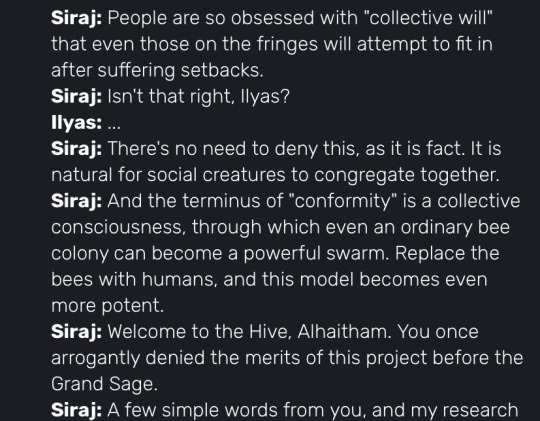
The novel revolves around its mary-suish character’s misunderstood genius, who falls victim of the smear campaign.
Everyone turns against him, even the woman he‘s in a situationship with, who gives up her own personal will and joins the mob against him out of resignation.
Dominique decides that since she cannot have the world she wants, in which men like Roark are recognized for their greatness, she will live entirely in the world she has, which shuns Roark and praises Keating. She marries Keating and turns herself over to him, doing and saying whatever he wants, and actively persuading potential clients to hire him instead of Roark.
There’s other characters who betray Roark (and their own principles) to follow the mob bc of outside pressure, which parallels the plot of Illusions of the Mob, where Siraj recruits multiple people who feel isolated to join his Hivemind - with the goal of getting rid of Alhaitham.
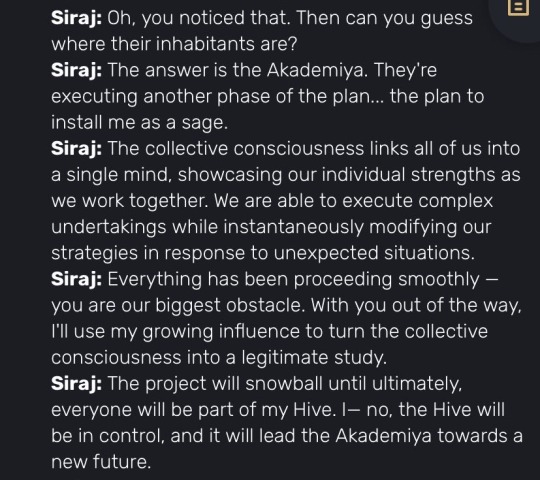
Rand’s argument stems from her anti socialist views, but it does make a point about “collectivism” hindering personal freedom and taking away individual identity.
But as Alhaitham himself puts it tho, this concept of collective was flawed from the start. It’s not real collectivism.
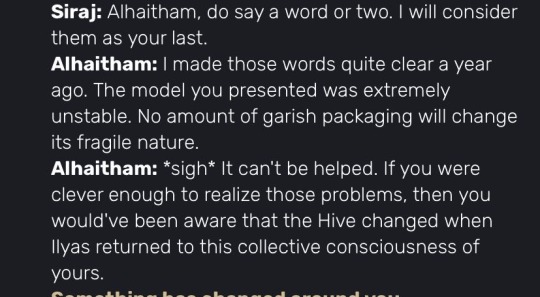
Collectivism has already been addressed by Genshin’s narrative at this point through Nilou’s character and the Grand Bazaar, where the community functions by helping each other when they’re in need.

(I have this post that goes it)
So by contrast the collective consciousness is not what Genshin accepts as a legitimate example of collectivism.
Even Alhaitham praises the Grand Bazaar at the end of the archon quest:
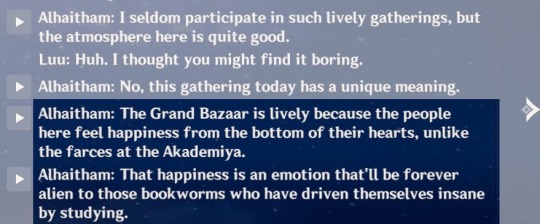
Ultimately though, I think the biggest own against Rand’s novel is the confrontation at the end of the quest between Siraj and Haitham.
Siraj seeks power and recognition for himself, but unlike the antagonist in the novel he doesn’t hide this fact. His subordinates knew all along he wanted to become a sage, and they weren’t coerced nor fooled into joining, Siraj just took advantage of their situation.
He had nothing to do with the problems those scholars were facing, and his Hivemind offered them what the environment at the Akademiya did not. The scholars willingly chose this alternative.
Toohey is Roark’s antagonist. He is Rand’s personification of evil —the most active and self aware villain in any of her novels.
Toohey is a socialist, and represents the spirit of collectivism more generally. He styles himself as representative of the will of the masses, but his actual desire is for power over others. He controls individual victims by destroying their sense of self-worth, and seeks broader power (over “the world”, as he declares to Keating in a moment of candor) by promoting the ideas of ethical altruism and a rigorous egalitarianism that treats all people and achievements as equally valuable.
Siraj believes Haitham to be a equal though, someone who has been ostracized by society due to their non conventional ideas, much like Roark in the novel (who btw dynamites a building from a project he was working on bc it didn’t follow his creative vision)
Alhaitham doesn’t care about neither recognition nor acceptance, his freedom comes from placing no value on outsider’s perspectives about him and staying true to himself.
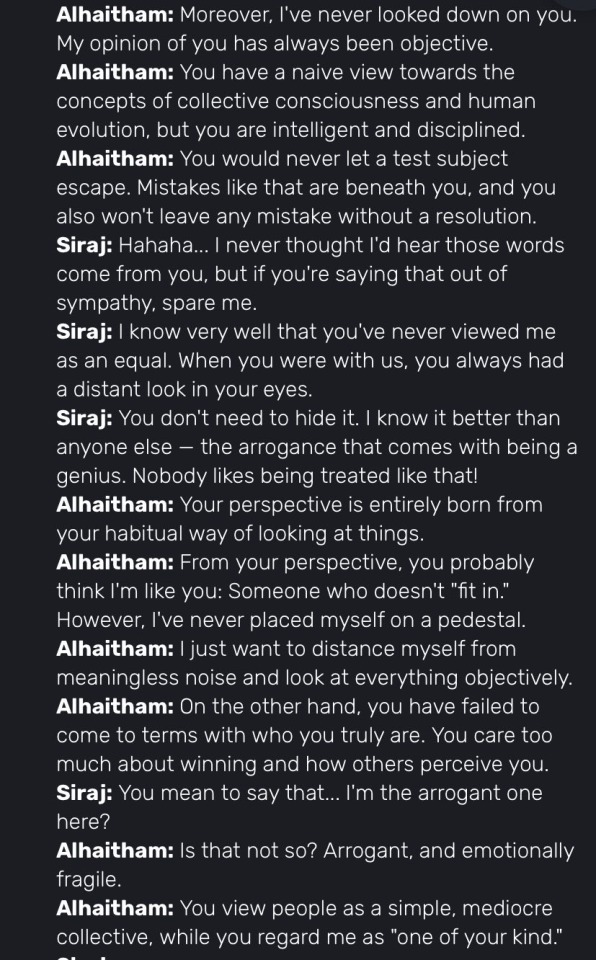
However, this is not a statement of superiority. We get to meet characters like Ilyas who had other constraints besides just being emotionally vulnerable, having a family to support and a career that demands connections. Haitham’s is not an accessible path to everyone.
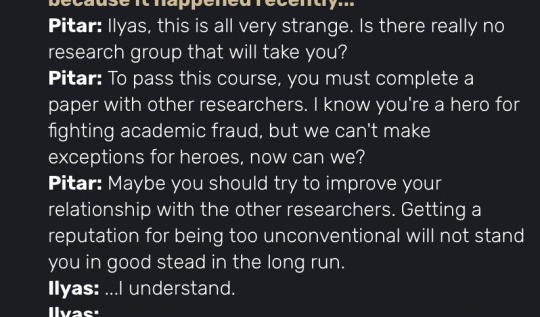
But, as the Acting Grand Sage, he does take care of the issue to make the working conditions of the Akademiya less suitable for this kind of mob mentality problems. Although the tradition of labeling people as genius and isolating them does persist I guess.
Alhaitham also has his own views challenged during the archon quest, where he finds a collective/team where he does fit (despite the disputes): the desert gang.
It is precisely because their emotions and principles collided that they were able to put together a plan, and why they were able to fool the Akasha so it would stop predicting Cyno’s moves.
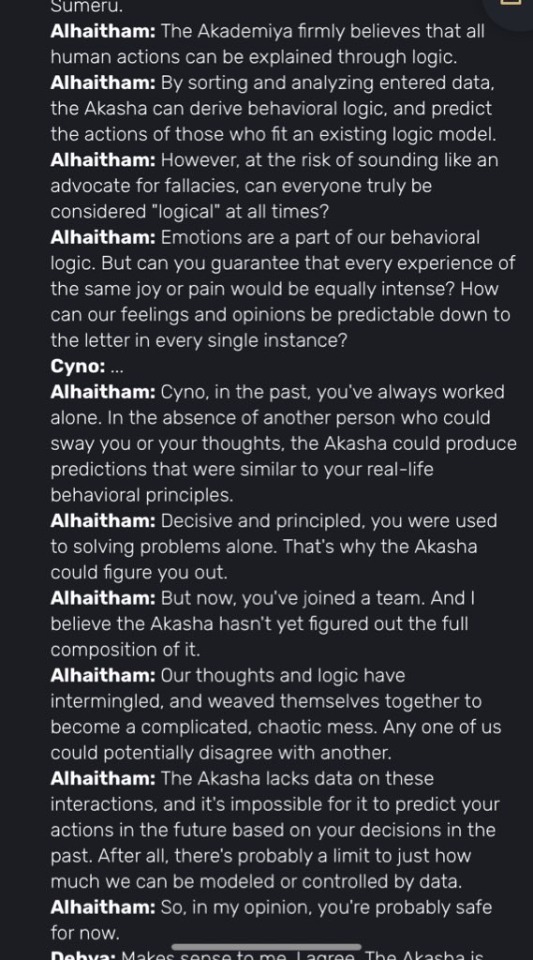
Alhaitham is not a character used as an argument against collectivism or having social connections.
He goes on to befriend Cyno, Dehya and Nilou with no problem. The archon quest comes across as a rather significant character development for him.
Now, on to Kaveh:
For Rand and libertarian incels, altruism is about sacrificing yourself for others. And that’s quite the statement, since altruism is just about attending other people’s needs, but that’s precisely what Kaveh’s character is about.
He’s not just an altruistic person, he voluntarily sacrifices himself in order to help others.
And Hoyo makes a point of it being something that affects his life negatively while also acknowledging he’s just going too far in the pursuit of this principle.
Yet Kaveh isn’t just a once dimensional antithesis to Haitham’s individuality. Like Roark in the novel, he embodies the pursuit of artistic innovation and the struggle against established values. Just, y’kno, not in a stupid way like Fountainhead.
As a field that combines art, technology, and business, it allowed [the author] to illustrate her primary themes in multiple areas. Rand later wrote that architects provide “both art and a basic need of man’s survival”. In a speech to a chapter of the American Institute of Architects, Rand drew a connection between architecture and individualism, saying time periods that had improvements in architecture were also those that had more freedom for the individual.
Roark’s modernist approach to architecture is contrasted with that of most of the architects in the novel. In the opening chapter, the dean of the architecture school tells Roark that the best architecture must copy the past rather than innovate and improve. Roark repeatedly loses jobs with architectural firms and commissions from clients because he is unwilling to copy conventional architectural styles. In contrast, Keating’s mimicry of convention brings him top honors in school and an immediate job offer. The same conflict between innovation and tradition is reflected in the career of Roark’s mentor.
In Rand’s views, this is more about praising capitalism, but in Genshin the Akademiya functions as capitalism itself does so Kaveh’s rather fighting the suppression of arts in the professional field against the prioritization of capitalist interests.
Anyway. Yeah. Haitham and Kaveh portray the two main themes depicted thru the protagonist in Rand’s novel, engaging with her philosophical ideas but discrediting her flawed point of view to offer a more interesting and compelling analysis of personal freedom & artistic innovation.
(Of course you can interpret kavetham with a romantic lens or frame thei relationship as romantic on the basis of that line but it most definitely was motivated by this narrative)
22 notes
·
View notes
Text
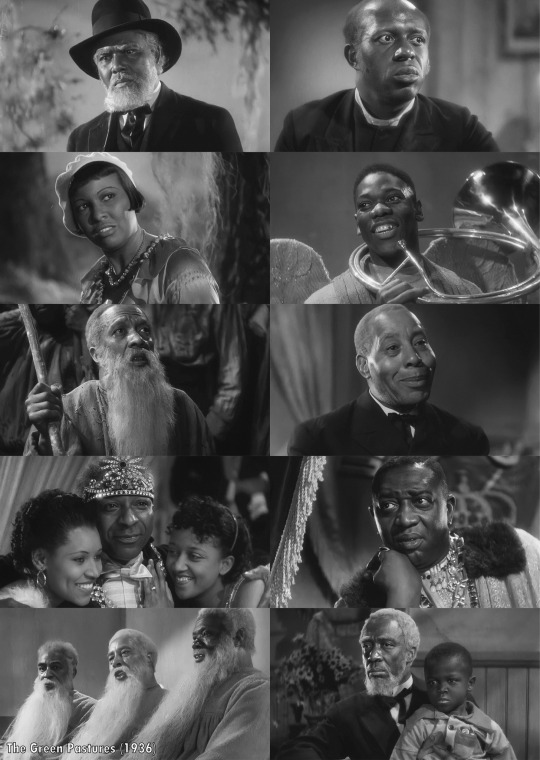
"The Green Pastures" (1936) is a fantasy film directed by Marc Connelly and William Keighley and written by Connelly and Sheridan Gibney, who based the film on the novel "Ol' Man Adam an' His Chillun" by Roark Bradford. Marc Connelly adapted the story into a Pulitzer Prize-winning stage play in 1930. The movie has an all-black cast film produced by Warner Brothers and stars Rex Ingram, Frank Wilson, Oscar Polk, Eddie 'Rochester' Anderson, and George Reed.
Unlike Race Films made by Oscar Micheaux and Ralph Cooper during this period, "The Green Pastures" was a major Hollywood production. The film received substantial advertising as the nation was already familiar with the play's success, so people were anticipating seeing the motion picture version. Rex Ingram was the lead in the film as the character "De Lawd."
The film features several up-and-coming actors, like Ingram, Eddie 'Rochester' Anderson, Oscar Polk, and Edna Mae Harris. For many, this was their breakthrough film. For example, George Randol, who played the high priest in the movie, started a production company with Ralph Cooper, where they released the first film produced with an all-black capital called "Dark Manhattan" in 1937. The film also featured the Hall Johnson choir. Mr. Johnson was a black composer known for his arrangements of African-American spirituals. Throughout the 30s and 40s, many films featured the ensemble, including "Dimples" (1936) and the controversial movie "Song of the South" (1946).
"The Green Pastures" is a fantastic film with wonderful music and charming characters. However, there are, without a doubt, stereotypical portrayals of black people within the movie. As a result, some people may find the film challenging to watch if they need help seeing past the 1930s attitude. Nevertheless, the movie is a remarkable production, and Rex Ingram will be unforgettable after you watch his performance. It's a personal favorite and one that I watch every year. I highly recommend it for viewing.
Directors: Marc Connelly, William Keighley Writers: Roark Bradford, Marc Connelly, Sheridan Gibney
Starring Rex Ingram, Oscar Polk, Eddie 'Rochester' Anderson, Frank H. Wilson, George Reed, Abraham Gleaves, Edna Mae Harris, James Fuller, George Randol, Hall Johnson Choir, Billy Cumby, Ivory Williams, Dudley Dickerson, Ida Forsyne, Myrtle Anderson, Charles Andrews, Ernest Whitman, Reginald Fenderson
Storyline A preacher in a small Black church in Louisiana tells his Sunday school class stories from the Bible as if the characters were part of a local fish fry. He starts with the creation of the world by God, known as "De Lawd" (Rex Ingram), and tells how God went on to create heaven, which is just like their farmland, and then created man and woman, followed by their fall and finally the coming of Jesus Christ.
Available on DVD and streaming services. https://www.amazon.com/Green-Pastures-Eddie.../dp/B00B6OECDK
3 notes
·
View notes
Text
3 notes
·
View notes
Text
0 notes